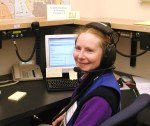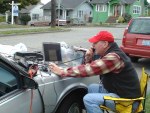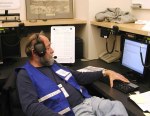Seattle ACS Blog is Active
November 9, 2011
Technician Class Course Needs Mentors and Speakers
October 8, 2010
Hello ACS Members,
The Technician Class License course introduced by Jonathan Scherch, KK7PW, is a Go. There will be about 12 students participating. Students will manage and advance their collaborative learning by participating in both 1) online study groups and 2) monthly evening class sessions.
1) Online Study Groups Need Mentors
We are signing-up mentors now for the weekly online study groups. You can mentor students for one week or more of the nine week course. It will be easy and fun. As a mentor you will:
- Post an entry identifying yourself and provide a brief biography of your experience as a ham
- Monitor the online classroom by checking in at least a couple times a day
- Respond to student questions and conversations with entries that expand learning
- Have fun!
We are using the Gordon West Technician Class manual for 2010-2014. You do not need to purchase the book as we will provide copies of the materials covered each week. Here is the schedule
| Week of | GWTC pages | Topics | Mentors | |
| 1 | 10/11 | Ch 1,2,3
1-24 |
Getting into Ham Radio, Technician License Privileges – Band Plans, Ham History | |
| 2 | 10/18 | Ch 4
25-50 |
Call Signs, Station Control, FCC rules | |
| 3 | 10/25 | Ch 4
51-75 |
Frequencies, Radios, Going on the Air | |
| 4 | 11/1 | Ch 4
76-100 |
Repeaters, Emergency Operations, Weak Signal Propagation | |
| 5 | 11/8 | Ch 4
101-125 |
Satellite Signals, Digital Operations, Multi Mode Operations, Interference | |
| 6 | 11/15 | Ch 4
126-150 |
Electrons: Go With the Flow!, Ohms Law, & Picture This! | |
| 7/8 | 11/22&29 | Ch 4
151-177 |
Antennas, Feed Me Some Good Coax!, & Safety First! | |
| 9 | 12/6 | Ch 5
178-187 |
Taking the Exam and Receiving Your First License | |
So pick a week(s) and contact Chris KE7JBF c.yody@comcast.net 206 850 6717.
Then “Join Group” at http://groupspaces.com/SeattleAmateurRadioTraining/ and we’ll provide your materials.
2) Monthly Evening Classes Need Speakers
We will convene three Wednesday evening class sessions to be held at Antioch University Seattle (6th Ave. & Battery St) from 6:00pm to 9:00pm, on October 13, November 10 and December 8, to complement the online content. These class sessions will allow us to meet and learn together.
We are seeking speakers for the October and November sessions for “show and tell” presentations. Speakers can bring equipment to give live hands-on experience to the students related to the material they are studying online.
So pick a session and contact Chris KE7JBF c.yody@comcast.net 206 850 6717
Then “Join Group” at http://groupspaces.com/SeattleAmateurRadioTraining/
The Technician Class License exam will be administered during the final evening class session on December 8.
———————————————————————————————————-
Finally, if you know anyone who would like to take this free course (manual cost ~ $20 and exam fee ~$15) direct them to “Join Group” at http://groupspaces.com/SeattleAmateurRadioTraining/
73
Chris Yody, KE7JBF
206 850 6717
Joint ACS/MST Holiday Lunch December 12 11am-1pm
December 4, 2009
Join us at Seattle Public Utilities 2700 Airport Way So. for lunch and camaraderie. This year’s program will feature Pascal Shuback from King County. Pascal will talk about current and future technologies in emergency management. Hope to see you there!
Coming Up in Training
November 16, 2009
Saturday November 21st – Regular ACS/MST Monthly Training 9-11:30am
Brian Daly will present Field Observer and Damage Assessment training (RADO training objective 208). The session will be held, as usual, at SSCC.
After the regular training, Mark Sheppard and Garth Brown will provide driving endorsements to members who plan to volunteer to drive others in emergencies (S-RADO objective 304). Bring the vehicle you expect to use and your preparedness kits for examination. Your preparedness to carry out a winter driving mission will be evaluated based upon this checklist:
mystateusa.com/docs/Seattle/acs-mst_wdt_checklist-bkd.pdf
Saturday November 21st – ARECC Level 1 Class 8:30-5pm
The 21st is also the first day of ARECC Level 1 (EmComm Level 1) Training. Brian Daly is the instructor for this 2 day-long course; November 21 and December 5 at SSCC. If not already registered contact Brian Daly wb7oml@arrl.net
Thursday December 3rd – WEBEOC and Resource Tracking & Message Management in the EOC 6:30-8:30pm at the EOC
Training and access to WEBEOC (S-RADO Objective 307) the online event tracking system used in the EOC. All members are encouraged to attend. If you do not already have a WEBEOC userid and password (or forgot yours) email Mark Sheppard mark.sheppard@seattle.gov by Dec 1st. Your userid and password will be provided at the training.
After the WEBEOC training Joel Ware will review resource tracking and message management procedures practiced in the EOC.
Saturday December 12 Joint ACS/MST Holiday Gathering 11-1pm
Mark your calendar! Lunch will be provided at Seattle Public Utilities 2700 Airport Way So. See you there.
EOC Operations Series Offered November 3, 12, and 19
October 26, 2009
Learn how the EOC works and how to perform a role in the EOC. These EOC Operations courses need to be taken sequentially. Completion of Basic is a prerequisite to Intermediate and Intermediate a prerequisite to Advanced. In certain circumstances (ie. completed ICS 100,200 and prior experience working in EOC) a waiver may be granted for attendance at the Basic course. These courses will be taught by EOC staff at the Seattle EOC 105 Ave So.
Tuesday 11/3 6:30-8:30pm Basic EOC Operations – overview including charter, goals and purpose
Thursday 11/12 6:30-8:30pm Intermediate EOC Operations – roles are explained and practiced
Thursday 11/19 6:30-8:30pm Advanced EOC Operations – adminstration and integration including situation reports and planning
Basic and Intermediate EOC Operations are objectives for the ACS Senior Radio Operator classification. Those who have taken these courses previously are welcome to attend to be refreshed on EOC Operations. See the Training and Events Calendar for additional information on these courses.
Posted by Chris Yody KE7JBF
Register Now for ARECC Emcomm Level 1 Class 11/21 and 12/05
October 19, 2009
ARECC Emcomm Level 1 Class, “Basic Emcomm”, or “Introduction to Amateur Radio Emergency Communications” satisfies one of the training objectives for ACS Senior Radio Operator (S-RADO); Objective 309 Understand theory and practice of basic radio emergency communication procedures.
The class will be held over 2 sessions, Saturday November 21 and Saturday December 5 at SSCC Olympic Hall. Classes will run from 8:30am to approximately 5pm both days. 100% attendance is required in both sessions in order to complete the class. Students will be asked to bring a lunch and snacks with them – there will be “working lunches”.
In addition to the classroom learning, students will be required to complete a number of activities outside the classroom. These activities will be provided by the instructor approximately 2 weeks prior to the first class session – half the exercises must be completed prior to the first session, and the remaining prior to the second session. It should take no more than 10 hours total to complete the activities.
The cost for the class is $50 for ARRL members and $85 for non-ARRL members and includes the class and exam fees. Bring checks or money orders on November 21st; payable to “Brian Daly”. The exam will be given on the second day of the class.
The class text is required and may be purchased from the ARRL directly – preferably order early to have a copy while doing the pre-classroom exercises. The cost for the book is $19.95. The book may be ordered from http://www.arrl.org/catalog/?item=8462-R#top.
To register, send an email to Brian WB7OML at: wb7oml@arrl.net. Please include your name, call sign, ARES group affiliation, mailing address, phone number, email address.
Registrations will be taken on a first come basis and in the case of full registration preference will be given to ACS and MST members.
Submitted by Chris Yody KE7JBF c.yody@comcast.net
ACS October Field Exercise – Yields Great Experience and Lots of Fun
October 15, 2009
The Drill provided new as well as experienced ACS radio operators an opportunity to work in new rolls, and gain new experiences. Joel Ware, KD7QKK Seattle ACS’s Deputy Director, served as COML and principal exercise planner. Joel did a very good job in structuring the drill and recruiting team members to serve in a capacity that they may have not done before. We tried some procedures that were new and prompted by lessons-learned in last spring’s exercise. These changes included: 1. Removing the bottle-neck of checking everyone in on PSRG, instead people were told to check on a UHF repeater by geographic location, PSRG was freed up for direction and coordination as well as contact from outside teams. 2. Physically moving the north net control to North Seattle Community College – to decentralize and free up some space in the EOC. This worked well and coordination was maintained using WEBEOC and radio. 3. Adding a second set of headphones to the EOC workstation consoles so a second operator could assist with message handling- this seemed to work well. Thanks to the technical work of Frank McJunkins K7RSD for completing this project prior to the drill. 4. Connecting with the Community Neighborhood HUBs. and 5. Including a couple of special projects; radio propagation testing for the Wallingford Hub and checking radio paths to some Port of Seattle Facilities.
Here is a list of Exercise Participants by assignment: (if we inadvertently left someone off the list let us know and we will update it)
| Name | Call | Assignment |
| Bill Dockstader | W7LSk | Field Comm |
| Boone Barker | KC7RK | North Sea Comm Ops |
| Chris Osburn | KD7DVD | Field Comm |
| Chris Yody | KE7JBF | West Seattle Comm |
| Christine Foss | KE7VND | EOC Comm Ops |
| Cindi Barker | KD7KSH | WS Communications Hub |
| Curt Black | WR5J | West Seattle Comm |
| Dale Nelson | KE7BSB | North Net Control |
| Dave Mann | KD7ZYM | EOC Comm Ops |
| Frank McJunkins | K7RSD | Pre Event Tech Support |
| Greg Dahlman | W7GHD | Field Comm |
| Greg Eastman | W7GLE | Port Comms |
| James Hadlock | K7WA | EOC Comm Ops |
| JD Wallace | N8JD | Wallingford Team Lead |
| Joel Ware | KD7QKK | COML Ex Planner |
| Llew Roberts | KG6GXY | EOC Comm Ops |
| Mary Heim | Wallingford Community | |
| Mike Maloy | KF7DTI | EOC Comm Ops |
| Russ Read | Port of Seattle EM | |
| Sandy Cook | K9SLC | Field Comm |
| Tammy Zoch | WA7TZ | EOC Comm Ops |
| Tareq Saade | W7TJS | Field Comm |
| Theresa Edwards | K7TEA | EOC Comm Ops |
| Todd Heuer | WA7FOX | EOC Comm Ops |
| Tom Croteau | WA9ZSK | Field Comm |
| Tom McIntyre | KB7KIF | Field Comm |
We will be conducting an after action review – lessons learned at the Seattle EOC 6:30 PM Thursday October 15 – please plan to attend – a summary will be posted here.
Please see the following photos from the event – send more if you have some…
October 10th Field Exercise Player Guide
October 8, 2009
Greetings – Thank you for agreeing to participate in the Seattle ACS/MST October 10, 2009 Comm Exercise (SET 2009). This package of information is intended to provide a basic overview of the purpose and objectives of the exercise and your role and what is expected. We want this exercise be a lot of fun and a good opportunity for all of to practice and learn. We want everyone to be creative and take some license in playing your role. Most of all be safe and remember your training.
Important Note: Only registered ACS and MST members are eligible to participate in this exercise – we will take check-ins from others but they will not be deployed to a field location unless they have a valid ACS or MST ID card number. You must be a registered Washington State Emergency Worker.
Statement of Purpose
The purpose of this exercise is to improve the readiness and effectiveness of Seattle ACS and Region 6 of the Western Washington Medical Services Team, by practicing all the processes that would be followed in a real-world incident.
Each year the ARRL encourages all ARES and RACES teams in the country to conduct a Simulated Emergency Test (SET), for the purpose of exercising the communication teams in a coordinated effort to communicate with served agencies and other neighboring jurisdictions. The teams are encouraged to utilize as many newly licensed operators as possible, both voice and digital modes, and to solicit publicity announcements.
After Action Review – Lessons Learned
All participants are invited to an exercise after-action review which will be held at the Seattle EOC at 6:30 PM on Thursday October 15, 2009. The Seattle EOC is located at 105 5th Ave S. (at the corner of 5th Ave S. and S. Washington St.)
Player Guide Documents (.PDFs) Linked Here:
Commex_ACS-MST_PlayersGuide_20091008 Final
ICS-205_CommEx_ACS-MST FINAL_20091008
MEDIA RELEASE: SEATTLE’S “HAM RADIO” ROLL IN EMERGENCY COMMUNICATIONS PREPAREDNESS TESTED IN NATIONAL EXERCISE SATURDAY
October 5, 2009
Media Photo and Sound opportunity at: Good Shepherd Center in Wallingford 4649 Sunnyside Ave N. Seattle Contact: JD Wallace cell phone 479-466-2074, North Seattle Community College 9600 College Way N. contact: Dale Nelson cell phone 206-406-6442 and West Seattle Neighborhood Communications Hub’s contact: Chris Yody cell phone 425-234-1442 from 10 AM – 11:30 AM Saturday morning.
Media contact:
Dave Mann, ACS, PIO
206 365-9700
Saturday October 10th
SEATTLE: Ham Radio’s roll in emergency communication and preparedness capabilities will be tested by the City’s Office of Emergency Management in a National Simulated Emergency Test (SET), sponsored by the Amateur Radio Relay League to test the capabilities of Amateur Radio to assist communities with the use of Ham Radio in times of Disaster and Community needs, when normal channels of radio communications fail.
Three Volunteer Radio groups, Seattle Auxiliary Communications Service (ACS), King County Medical Service Team, supporting Seattle Hospitals and Neighborhood Preparedness Teams will participate in the exercise that centers around a server winter storm and Green River Flooding causing wide spread communications disruptions to Seattle. This simulated event will include loss of conventional and cellular phone systems as well as overloading of municipal radio systems that serves police, fire and all city agencies.
Using battery powered HAM radios, members of the Seattle Auxiliary Communications Service will set up radio field networks to relay emergency service requests by radio voice and digital text. Messages will be sent and received in support of various City agencies and neighborhood communications posts located across the City. The City’s Emergency Operations Center, using Ham Radio Station W7ACS, will be the central communications hub during the simulated disaster event to assist the City’s Emergency and Recovery response. Another station will be operated at North Seattle Community College to test redundancy and distribution of resources.
Mark Sheppard, ACS Director said, “New to this year’s SET will be the connection with Neighborhood Radio Network Hubs from West Seattle, Queen Anne / Magnolia and Wallingford to relay simulated emergency service requests and damage assessments to a central field hub for ACS members to forward this information with the use of Ham Radio to the City’s EOC to provide emergency services.” These hubs provide a mechanism for Seattle Neighborhood Actively Prepare (SNAP) Teams to communicate with the City.
Western Washington Medical Service Team is the third group participating in this exercise and will be setting up and testing emergency communications networks between Canada and the US for the 2010 Olympics for medical support from Western Washington and Seattle health care facilities , should the need arise.
Brian Daly, MST Emergency Coordinator said, “Our unit will use the exercise also to prepare for possible Howard Hanson Dam flooding , which could impact healthcare facilities and supply houses in the Green River Valley. Establishing emergency communications networks will better prepare us for scenarios we may encounter this winter, and demonstrate our preparedness to support the mission to help healthcare maintain 24x7x365 communications.”
Because of the complexity of today’s normal communications systems, even if they remain functional they are often overwhelmed in a disaster. Ham Radio played a critical roll in the recent Hurricanes, Floods and Ice Storms when normal communication failed and provided emergency communications assistance between many government and volunteer agencies.
The purpose of the SET is to find out the strengths and weakness of Ham Radio groups in providing emergency communications and provide a public demonstration–to served agencies such as Municipal Emergency Operation Centers, Red Cross, Port of Seattle and Civil Preparedness–of the value to the public that Amateur Radio provides, particularly in time of need. The SET is designed to help radio amateurs gain experience in communications using standard procedures and a variety of modes under simulated emergency conditions. This is the main goal outlined by the Amateur Radio Relay League (ARRL), the national membership association for amateur radios operators in the United Sates, sponsors of the national annual SET exercise.
ACS, MST and SNAP volunteers that serve the City of Seattle in the roll of backup radio emergency communications participate in monthly training sessions to enhance their emergency messaging skills for lifesaving services and communications for Seattle Office of Emergency Management. Weekly radio communications network test are conducted by the groups to test the readiness of their equipment and operational proficiency.
MST is an amateur radio volunteer group that provides back up vital emergency communications between medical facilities and suppliers in the community. MST members are affiliated with ARES (Amateur Radio Emergency Service) an amateur radio public service organization sponsored by the ARRL. Membership of ARES is open to all licensed Amateur Radio Operators.
ACS Members are a team of over 100 unpaid volunteer communications professionals that assist the City Seattle with public safety and emergency communications in time of disasters and/or community needs. ACS is affiliated with the Radio Amateur Radio Civil Emergency Service (RACES) sponsored by FEMA to serve Emergency Management Departments.
Seattle SNAP is a program that educates people about disaster preparedness for hazards that may impact their area and trains them in basic disaster response skills, such as fire safety, light search and rescue team organization. This group serves the Seattle Office of Emergency Management.
For more information about the City of Seattle Emergency Management Services and the SNAP program please visit: http://www.seattle.gov/emergency/default.htm
Information about Seattle ACS or how to join the team please visit the Seattle ACS website: http://seattleacs.com. For more information about the Western Washington Medical Service Team, visit: http://ww7mst.org.
Information on the Communications Hub Program:
West Seattle site: http://westseattle.beprepared.info/site/page1.aspx
Queen Anne / Magnolia: http://seattledisaster.org/planrevised10-08.pdf
Wallingford: http://council.iactivesite.com/page.aspx?navid=1544
ACS/MST Field Exercise October 10th
October 4, 2009
We are inviting all Seattle ACS members as well as KC MST members assigned to Seattle Hospitals to participate in the Field Exercise scheduled for Saturday October 10, 2009 beginning at 0900 and running to approximately 1130. This drill is part of the National ARRL Simulated Emergency Test or SET. The exercise scenario will be based on a communications disaster caused by a severe winter storm and complicated by the flooding of the Green River in the Kent Valley. We will not be using our call out paging system – we will expect all participants to listen on the PSRG repeater 146.96 MHz. at 0900 for a short briefings describing the exercise scenario and instructions on what to do.
You will be given instructions to check in on a specific UHF repeater corresponding to your location. You will then be assigned to report to a specific location to team up with other ACS members or to operate individually. Some participants may not be able to travel – let net control know and you will be give an assignment at your location.
Remember – to always include the phrase: “This is a drill and not a real emergency” – please say this frequently.
What you will need to participate:
- A radio or radios capable of operating on VHF and UHF (please pre-program to the Seattle ACS frequencies – see chart below
- The Seattle ACS Message Form with instructions – a PDF is available here – please down- load and print copies as needed. ACS Message Form w_instructions-10-2-08b
- The Exercise instructions including the Frequency Plan ICS-205 this will be distributed later this week. This will provide you much more information about how to participate and create messages.
- Willingness to travel around the area, if you can.
- Please confirm your participation in this important exercise by e-mailing Mark, N7LYE at
n7lye@arrl.net
| EOC VHF – (rev 12-30-08) | ||||||
| Chl # | Display | Rcv Freq | Xmit Freq | Xmit Tone | Rcv Tone | Comments |
| 1 | PSRG RPTR | 146.96 | 146.36 | 103.5 | ACS Main | |
| 2 | ACS SIMPLEX N | 146.56 | 146.56 | 103.5 | X-band Repeat | |
| 3 | ACS SIMPLEX S | 147.58 | 147.58 | 103.5 | X-band Repeat | |
| 4 | PSRG Out | 146.96 | 146.96 | 103.5 | Repeater Output | |
| 5 | MST RPTR | 146.9 | 146.3 | 103.5 | ||
| EOC UHF – (rev 10-2-09) | ||||||
| Chl # | Display | Rcv Freq | Xmit Freq | Xmit Tone | Rcv Tone | Comments |
| 1 | ACS NE | 443.65 | 448.65 | 141.3 | 141.3 | Maple Leaf Repeater |
| 2 | ACS CAP HILL 1 | 443 | 448 | 141.3 | 141.3 | GHC Capital Hill |
| 3 | ACS W SEA | 441.8 | 446.8 | 141.3 | W Seattle Myrtle | |
| 4 | ACS MAGNLIA | 443.475 | 448.475 | 141.3 | Magnolia Res | |
| 5 | ACS LFPARK | 442 | 447 | 141.3 | Lake Forest Park Res | |
| 6 | ACS CAP HILL 2 | 442.875 | 447.875 | 141.3 | 141.3 | Cap Hill WA7UHF |
| 7 | ACS BEAC HILL | 440.525 | 445.525 | 141.3 | ACS Beacon Hill WA7UHF | |
| 8 | X BAND NORTH | 446.025 | 446.025 | 141.3 | out on 146.56 | |
| 9 | X BAND SOUTH | 445.825 | 445.825 | 141.3 | out on 147.58 | |
| 10 | QUEEN ANN | 444.7 | 449.7 | 103.5 | K7PAL | |
| 11 | MST VA | 443.55 | 448.55 | 103.5 | Med Services Beacon Hill | |
| 12 | COLUMBIA CTR | 444.550 | 449.450 | 141.3 | Seattle ACS wide area | |
| 13 | KC SAR | 444.525 | 449.525 | 103.5 | Squak – Fire & MST/Issaqua | |
| 14 | CHNL 9 TWR | 444.375 | 449.375 | 203.5 | AJ7JA Fat Salmon | |










